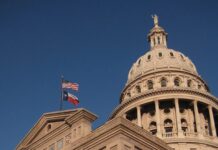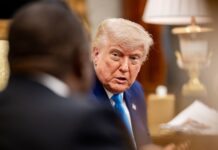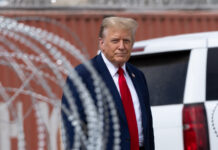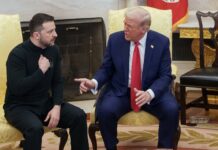One of the defining policies of this version of the Trump administration has been its immigration policy. Trump’s fight against immigration has moved on from the US southern border to university campus all across the United States of America. Since the beginning of the Trump Administration, there have now been several high-profile cases of students being arrested by Immigration and Customs Enforcement (ICE) agents. Their crimes? Expressing a viewpoint about Israel’s war in Gaza that differs from that of the Trump administration.
These actions by the Trump administration are a direct affront to freedom of expression, which is guaranteed in the United States Constitution in the First Amendment. Members of the Trump administration have attempted to argue that, since they are international students, the same laws do not apply to them, therefore, they are justified in their actions. However, one would just have to look at the words of the First Amendment to know that is not true.
“Congress shall make no law respecting an establishment of religion, or prohibiting the free exercise thereof; or abridging the freedom of speech, or of the press; or the right of the people peaceably to assemble, and to petition the Government for a redress of grievances.”
US First Amendment
The point of the First Amendment is to limit the power of the government. The law is clear in that. There are no exceptions made for people who are in the United States on a student visa, but that is what the Trump administration is attempting to argue. As a result, we have seen several arrests of students and attempted visa revocations by the Trump administration. In April, the Trump administration would revoke the student visas of over 1800 students at over 280 US colleges and universities as part of its ongoing campaign of targeting students for their speech or participation in protest.
The Trump administration has also started a major ongoing battles against universities because of the widespread protests that took place on university campuses last year against the state of Israel for its war in Gaza. Even though campuses are public spaces where protests are allowed. That hasn’t stopped Trump or his administration. The main tactic used by Trump to go after university has been by freezing funds for research to US universities and sending letters to universities, making demands of major higher education institutions.
The funds frozen by the US government amount to hundreds of millions of dollars used by American universities. Such a large and drastic cut to their funding would have a lot of negative consequences for their day-to-day operations. The Trump administration is then using that leverage to pry all sorts of concessions out of US universities, which would go against their status as independent organisations and are almost always very political in nature.
Some of the demands the Trump administration has made have included things like banning face masks on university campuses, empowering security officers to arrest students on campus, identifying students participating in demonstrations on campus and reforms of their admissions of international students. In the instance of Columbia University, the Trump administration demanded that it take over control of the department that offers courses on the study of the Middle East. Despite Columbia being a private university, which gives it the right to design its own courses.
This week, Homeland Security Secretary Kristi Noem announced that the Trump administration would block Harvard’s ability to admit international students, and all currently admitted international students would be forced to transfer to another university. Harvard is currently receiving the brunt of these attacks because of their refusal to simply cave to the demands of the Trump administration.
Harvard’s refusal to comply with SEVP oversight was the latest evidence that it disdains the American people and takes for granted U.S. taxpayer benefits. Following our letter to Harvard, the school attempted to claim it now wishes to comply with SEVP standards.
— Secretary Kristi Noem (@Sec_Noem) May 29, 2025
We continue to… pic.twitter.com/6yg0roqqf5
All of this is coming from a ‘conservative’ administration. For so long, conservatives have been the ones claiming to be fighting for freedom of speech. Conservative influencers have long lamented the fact that they felt censored in their ability to express themselves on social media and college campuses. And yet, now, when a conservative administration is in power in the US government, they are the ones using their power to restrict the freedom of expression of universities and students.
The First Amendment of the United States of America is probably the one major thing that has set it apart from many other countries in the world. It is rare for a government to purposefully place restrictions on itself, the way that the founding fathers of the United States did. In many of our countries, we have similar laws in our constitutions, but these laws very often come with major exceptions or are rarely even respected by our governments or law enforcement agencies.
Early in the Trump administration, US Vice President JD Vance would even make that point during a trip to Europe for a NATO summit. JD Vance attempted to call out European leaders for the laws they have in their countries that restrict people’s ability to express themselves. During his illustrious speech, Vance would also denounce the Biden administration for the steps it had taken to censor what it deemed “misinformation” on major social media platforms.
Today, the speech given by JD Vance comes off as highly hypocritical, considering the attempts by the Trump administration to restrict the speech of international students and universities. However, there is a lot of truth in the assessment that free expression is not guaranteed in Europe either. In many European countries, there are laws that put restrictions on the ability of their citizens to freely express themselves. For example, there are laws that make it a crime to insult elected leaders in many European countries.
Many European countries also have laws that criminalise posting “offensive” or “hateful” content online. At the European Union (EU) level, we have seen the EU go after social media companies, seeking to force them not to allow the spread of what they deem as misinformation or disinformation on their platforms. And in the United Kingdom, it seems every week, there is a new video going viral of its citizens being arrested by British police for posting content online deemed offensive by British authorities.
The African continent is no better. In fact, by most measurements, it is arguably much worse. In many of our countries, though they may claim to be democracies, there is no such right to freedom of expression. It is not an uncommon experience for journalists and activists in many of our countries to find themselves being threatened, arrested, jailed, or even killed by government authorities for their speech. Even though in many of our countries, we have a constitutional right to free expression, its practical implementation in the real world is often lacking.
While the right to freedom of expression is a foundational American value, it hasn’t always been equally protected for all citizens. Throughout U.S. history, many groups were denied this right, but the ideal remained powerful. Those whose voices were silenced fought to claim the same freedoms that others enjoyed, affirming that the right to free expression belongs to everyone, not just a privileged few. However, today, the Trump administration appears to be reverting to such a time again.
The Trump administration is putting out the message to all prospective and current international students that their speech is going to be heavily policed. Just this week, the Trump administration ordered a pause on the issuing of all student visas, for them to put in place a new system where they would check the history of social media posts made by prospective students looking to study in the United States.
In March, Rümeysa Öztürk was arrested by officers from the US Department of Homeland Security (DHS). She would later be transported in the custody of ICE and would have her student visa revoked. A group of plain-clothed officers in an unmarked car would arrest her near her home. What crime could Öztürk have committed that would warrant such action being taken by the DHS officers? She wrote an article in her University newspaper, the Tufts Daily, that was critical of Israel’s actions in their war in Gaza.
Only in truly oppressive regimes could simply contributing to a newspaper column result in a group of armed officers arresting you at your home. However, this happened in the United States of America. Öztürk did not make any calls for violence or write anything that could be considered antisemitic towards Jews in the column she contributed to. The column discussed the allegations of genocide directed at the state of Israel and called for Tufts University to avoid doing business with companies with ties to the state of Israel. For that, Öztürk would be arrested and have her visa revoked.
Federal immigration authorities detained a Turkish graduate student at Tufts University. The government hasn’t filed any charges against Rumeysa, Ozturk, who was in the U.S. on a student visa, her lawyer said.
— The Wall Street Journal (@WSJ) March 26, 2025
Read more: https://t.co/Vs3iLHGAkU pic.twitter.com/29aNJWaJmr
Pehaps the most concerning trend is that it is not only students that the Trump administration has decided to target. Even US green card holders have discovered that they are not immune to the predations of the Trump administration. As is the case with Mahmoud Khalil. Khalil would be arrested by ICE agents in March earlier this year for his role in the pro-Palestinian protests that had taken place at Columbia University last year. He was arrested by Immigration and Customs Enforcement officers to be deported, even though he is a US permanent resident.
Now, the Trump administration is attempting to strip him of his green card because of his role in the protest at Columbia University. And these are just some of the most high-profile cases of the Trump administration’s crackdown on dissent on American university campuses. Thousands of students have already had their visas revoked under similar circumstances that have not received nearly as much coverage. And the Trump administration is looking to expand this crackdown even more with its changes to the vetting process that will be instituted on visa applications.
The only saving grace there has been so far against this attack on the free expression of students has come from the US courts. Mahmoud Khalil and Rümeysa Öztürk have been able to appeal their deportations in court, and so far, Rümeysa Öztürk has managed to come out of ICE detention. Mahmoud Khalil, however, is still fighting his legal battles at the time of writing this article. We are yet to see what the outcome of his deportation proceedings will be. Likewise, various US institutions of higher education have taken their battles with the Trump administration to court.
The message the Trump administration is sending out is clear. The First Amendment does not apply to foreigners residing in the US. If you, as a foreigner, are discovered to have said or done anything that goes against the political agenda of the Trump administration, you will most likely find yourself being deported from the United States of America. And that applies to both international students and even permanent residents currently residing in the US.
Such blatant disregard for the right to free expression should alarm all Americans, regardless of political affiliation. History shows that once the government gains the power to silence one group, that power rarely stays confined. Today, it may be international students and green card holders, but tomorrow, it could just as easily be everyday Americans. If this erosion of rights is allowed to continue unchecked, the question then arises: What will remain of the First Amendment?












